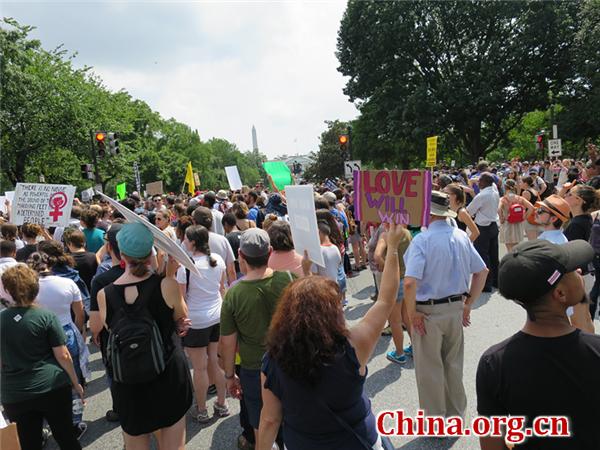The alt-right's lasting impact
- By Mitchell Blatt
 0 Comment(s)
0 Comment(s) Print
Print E-mail China.org.cn, August 22, 2018
E-mail China.org.cn, August 22, 2018
The much anticipated, and feared, racist rally in Washington, DC on Sunday (August 12) ended up being a total flop for the alt-right and a victory for counter-protesters.

No more than 30 alt-right supporters attended, and they were vastly outnumbered by thousands of anti-racist counter-protesters. A heavy police presence prevented fights from breaking out.
Activist progressive and radical groups like Resist Fascism, Revolutionary Communist Party, Black Lives Matter, and Antifa had begun organizing long in advance, and they were joined by individual liberals and moderates who oppose the whole alt-right concept.
It was a great disappointment for rally organizer Jason Kessler, who hoped to capitalize on the alt-right's showing at the "Unite the Right" protest on August 12, 2017. Five hundred racists gathered in Emancipation Park of Charlottesville, Virginia, waving Nazi and Confederate flags, carrying torches and brandishing firearms.
They were met by over 1,000 counter-protesters, whom they attacked with improvised weapons and fists. One white supremacist terrorist even drove his car into the crowd, killing counter-protester Heather Heyer.
This year, however, the racist demonstration was restricted to one side of the park in front of the White House, which the tiny group had not the slightest chance of filling, and the racists quickly left after less than an hour of speeches.
Two days after his humiliating failure, Kessler recorded a video from his parent's home with the title, "Potentially hundreds of people were prevented from attending #UTR2 [Unite the Right 2]."
Yet even the fact that racists would hold such public rallies in the capital is causing enough for concern. Other racist alt-right events that have taken place elsewhere in the country, including in Portland, Oregon on August 4, have also been violent.
Donald Trump's open racism and policies motivated by racism have been a major reason for the alt-right enjoying some degree of popularity between 2015 and 2017. When Trump attacked immigrants and minorities so viciously, he made racists and xenophobes feel they didn't have to censor themselves any longer.
Other presidents had pushed anti-immigration policies to a certain degree; however, they usually made great efforts not to appear to use any racist arguments–or tried to hide racist arguments behind an edifice, dog whistling in effect.
Trump's campaign announcement speech in June 2015 accused Mexico of "sending" the United States bunches of illegal immigrant rapists. By August 2015, users of Stormfront, a white supremacist website, were comparing Trump (favorably, in their minds) to Hitler.
Trump won early support from Andrew Anglin of The Daily Stormer and Jared Taylor of American Renaissance, two blatantly racist media outlets. Quickly, the presidential campaigner noticed his racist appeals were working, so he made outreach to such groups in speeches and via Twitter. He shared racist messages from Twitter users who included Nazi imagery in their biographies.
The alt-right, which had once included a hodgepodge of loosely-related groups, began to work together more frequently. Anti-gay extremists joined conspiracy theorists. Racists joined sexists. Breitbart, which was considered a relatively mainstream, if not terribly reliable, conservative website when first launched, declared itself "the platform of the alt-right."
Trump's 2016 campaign brought together hardcore, unapologetic racists like former KKK grand wizard David Duke and advocate of ethnic cleansing Richard Spencer with casual xenophobes who supported Trump because of resentment and opposition to "political correctness." One sign at a Trump rally in March 2016 put it like this: "Deplorables [a nickname for Trump voters] and Alt-Right Unite."
"Unite the Right 2017" was supposed to be the grand coming together. In reality, it was the last hurrah. Already the alt-right was being divided by infighting among those who harbored varying degrees of racism. Some, described as the "alt-light," claimed to be trolls or "free speech supporters" and tried to distance themselves from explicit racists.
Accusations flew back and forth, and alt-right personalities denounced each other. Apparently, neo-Nazis aren't very tolerant of anyone.
There was so much violence and people on the street filmed making Nazi salutes that they couldn't hide behind any excuses. Participants who had been photographed lost their jobs and were socially shunned. Charges were filed in criminal and civil court. Today, most alt-right leaders don't even like Jason Kessler, and urged their followers not to attend Unite the Right 2.
Unite the Right is a case study in how demagogic leaders can exploit racism to take power. It shows the dangers of citizens and political movements allying with evil for short term gains. Most Trump voters, even if they might be motivated by racial grievances and unconscious biases, do not agree with Richard Spencer.
However, they helped increase Spencer's influence and others like him when they allowed an alliance of convenience to coalesce among anybody who supported Trump. They made this possible, too, by not turning away from Trump when he crossed many red lines. Surely, there must be a political cost to pay for a politician to pursue neo-Nazis.
It is also a case study in how effective counter-protest can be in combating racism. There's a saying you will see on the T-shirts of some counter-protesters: "Make Nazis scared again," a play on Trump's campaign slogan. Fear of social shaming, discomfort, being outnumbered, and, yes, violence kept many alt-right supporters at home.
Unfortunately, the U.S. is already seeing the grave consequences of alt-right racism. People are dead, a racist is in the White House, and toned-down versions of alt-right arguments have spread to popular news channels. Unite the Right 2 was a flop, but it will take much longer to reverse what the alt-right has already done.
Mitchell Blatt is a columnist with China.org.cn. For more information please visit:
http://www.china.org.cn/opinion/MitchellBlatt.htm
Opinion articles reflect the views of their authors, not necessarily those of China.org.cn.






Go to Forum >>0 Comment(s)